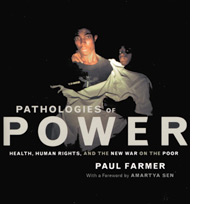
In this age of affluence and technological mastery, we face a grim truth about the quality of life on the planet: For many millions around the globe, the most basic human right — the right to survive — simply cannot be guaranteed. The dreadfulness of the situation — in his fine foreword, Nobel laureate Amartya Sen notes that the median age at death in sub-Saharan Africa is under five — can lead even the most committed humanitarian to despair.
The temptation to reach for theatrical metaphors (human tragedy) or existential ones (cruel fate) is one that Paul Farmer resists at every turn. A physician-anthropologist at Harvard, he is resolutely political in his approach. Farmer argues that mass suffering is not, as some would have it, a fact of life, but rather a matter of choice. It’s the product of what he calls “structural violence” — the inequities produced by man-made institutions that sustain “an undeclared war on the poor.”
Farmer’s first priority is to awaken us to the suffering of the world’s “nobodies.” To this end, he vividly narrates his experiences treating HIV in Haiti and confronting the tuberculosis epidemic in Russia’s prisons. For Farmer, of course, merely bearing witness to suffering is inadequate; we also need solutions. He looks to liberation theology for the ideals to guide his demanding program of international ethics, one that insists on forging active solidarity with the most vulnerable citizens of our world, while declaring “health rights” to be an essential human right.















